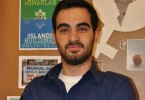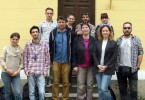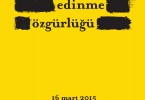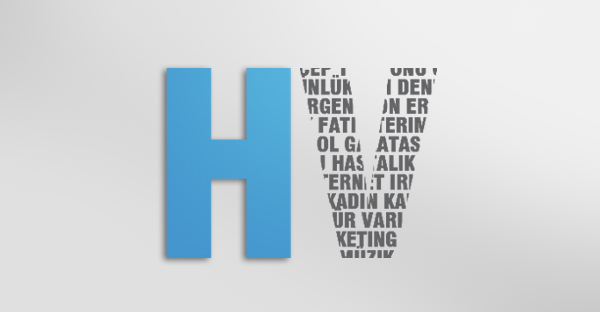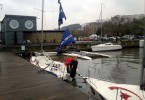Niyazi Dalyancı
“Opening” is the word that has dominated Turkey’s political scene for more than six months now. It seems that the coming winter months would not be able to witness a change of tune unless earthshaking events push this term to the backstage.
One of the so-called policy openings concern Turkey’s biggest domestic headache, the Kurdish problem. The other is related to the normalization of relations with Armenia.
Although both initiatives were met with optimism in the beginning, six months later they seem even more entangled than ever.
It is also interesting to note that both initiatives gained momentum after the new U.S. President Barack Obama visited Turkey in April and delivered an address to the deputies in the Turkish Grand National Assembly.
“In the last several years, you have abolished state-security courts and expanded the right to counsel. You have reformed the penal code, and strengthened laws that govern the freedom of the press and assembly. You lifted bans on teaching and broadcasting Kurdish, and the world noted with respect the important signal sent through a new state Kurdish television station,” told Obama to his Turkish interlocutors.
According to some Turkish commentators, the U.S. administration has been applying pressure on the Turkish government to solve its Kurdish problem before the American troops pull out of Iraq by 2012 as promised by Obama. American policy-makers are planning to put the Iraqi Kurds under Turkey’s protection against possible attacks from the Sunni and Shiite Arabs after the pull out, according these commentators. In order for the implementation of this policy, Turkey has to pacify the civil strife in its Kurdish provinces neighboring northern Iraq.
On August 5, Prime Minister Tayyip Erdogan met with Ahmet Turk, the leader of pro-Kurdish Democratic Society Party (DTP) and a group of deputies. Until then, he had insisted that he would not have a face-to-face meeting with DTP members unless they declare that PKK (Workers Party of Kurdistan) which has been waging armed struggle against the Turkish army and security forces as “terrorists.” Erdogan had said that he would not talk to DTP as prime minister. That is why the meeting took place at Erdogan’s Justice and Development Party’s (AKP) quarters in the parliament building and party officials made the point that Erdogan was meeting DTP members as a party leader not as Turkey’s prime minister.
After the meeting both Erdogan and Turk made statements somewhat hopeful for the future.
“We have launched an initiative under the coordination of the interior ministry. Work is continuing with the participation of our political parties, civil society organizations, academicians and representatives of media who all have a lot to say about this subject. Personally, I believe that we have mutually benefited from our one-hour meeting and I hope that we will take positive steps based on mutual trust towards the future,” Erdogan said. However, he also added that the problem in question might not be overcome in the short term, “but I believe we will overcome it in the long run.”
“We hope that we shall come across positive developments. We all have important duties and responsibilities. We will continue working with this understanding. We wish that we shall arrive at happy and beautiful days,” Turk said on his part.
Only a week later, DTP’s Mardin deputy Emine Ayna at a meeting in the eastern province of Igdir said no peace process is possible if Abdullah Ocalan, the PKK leader serving life imprisonment on a special penitentiary on the island of Imrali, is not included in the picture. She added that Ocalan would announce a “road map” on August 15 and her party would act according to it.
Ocalan has been issuing statements from his island-prison through his lawyers who visit him regularly. But the “road map” did not come on August 15. Ocalan’s lawyers announced after visiting him on August 14, that “he could not finish writing the road map.”
Finally, the guidelines of Ocalan’s “road map” were made public through his lawyers later in August. Now, the PKK leader says he is against setting up an independent Kurdish state.
Ocalan’s road map
“Not even a federation like in the south,” meaning the Kurdish administration under Masoud Barzani.
The lawyers said the PKK leader told them his plan cannot be perceived within the scope of classical patterns. “It looks somewhat like the European model, but my model is more advanced. Europe is not democratic enough,” the lawyers quoted Ocalan as saying.
“My model for solution is this: On the one side there will be the state and on the other the democratic Kurdish nation. Kurds will recognize the existence of the state and the state would accept the Kurds’ right to exist as a democratic nation,” the lawyers reported as Ocalan’s remarks.
Ocalan’s road map also includes all kinds of organizational rights for the Kurds. “Kurds will acquire entity as a democratic nation. They will be able to organize their sports, education, religious organization, their assembly and their local administrations,” said Ocalan.
He also referred to organization of Kurdish “self-defense” forces, which is interpreted as the legalization of PKK.
Following the publication of the “road map” in the Turkish media, political scientists, politicians, commentators and even DTP parliamentarians tried to clarify what Ocalan was meaning with his new concepts such as self-defense forces, assemblies, etc.
“He says he does not want federation but the concept of self-defense forces go beyond a federal organization. It is not clear what this Democratic Autonomy Project really corresponds to,” commented Prof. Mithat Sancar from Ankara University Law School.
DTP deputy Hasip Kaplan interpreted Ocalan’s road map as transferring some of the functions of central authority to local administrations.
“I interpret his concept of self-defense not as a separate army. When local assemblies acquire more authority there will be need for implementing and enforcing their decisions, like the traffic police,” Kaplan said.
“Forget Imrali”
While everybody were trying to figure out what Ocalan meant in his road map, President Abdullah Gul answering questions at a reception late August said, “Forget Imrali. Imrali is not an interlocutor in this case.”
Imrali as the name of the island prison where Ocalan has been kept has become synonymous with Ocalan himself especially in the pro-Kurdish media.
Despite President Gul’s categorical rejection of Ocalan’s road map, it became quite clear that DTP as a party has been thinking otherwise.
At the DTP Congress in the beginning of October, the party leader Ahmet Turk once again pointed out that Ocalan should be included in the Kurdish opening.
“When you consider the magnitude of the Kurdish problem and its complexity, Ocalan’s effective role in solving the problem is obvious,” Turk said.
In a more candid statement to the press earlier Turk confessed that his party cannot be considered as the only interlocutor in the peace process. “How can you solve the problem without negotiating with PKK, the armed fraction in the question? We are not powerful enough to say if you do such and such PKK will lay aside their arms,” Turk said.
Meanwhile, Interior Minister Besir Atalay has been having meetings with journalists, academicians and representatives of civil society organizations to sound out their ideas about the “Kurdish opening.” During the second week of October he was in Diyarbakir to find almost all the shops had pulled down their shutters in protest of Ocalan’s expulsion from Syria ten years ago. Crowds clashed with police in Diyarbakir, Van, Hakkari and Batman as they launched unauthorized demonstrations for the anniversary of Ocalan’s expulsion that led to his arrest in Kenya in 1999.
Despite all the determination displayed by Prime Minister Tayyip Erdogan and his government “To put an end to blood letting,” it seems the process has entered an impasse because of Kurdish side’s insistence to bring in Ocalan as a party and the government’s refusal to accept what they call a “terrorist leader” as an interlocutor.
The situation got even more muddled when Ocalan’s words communicated through his lawyers during their last meeting in October were published in a pro-Kurdish website. Ocalan complained that both DTP and PKK were trying to overload him with more responsibility.
“The state is also pushing on me all the responsibility. DTP and PKK are doing the same. This is not fair. DTP sometimes makes very sharp comments and sometimes does not know what to say. By these political methods DTP cannot address the Kurds any longer,” Ocalan was quoted as saying.
War of words with the opposition
“Kurdish opening” is also encountering dire problems from the parliamentary opposition. The extreme rightwing Nationalist Action Party (MHP) leader Devlet Bahceli has repeatedly rejected the approach of Erdogan going as far as calling it “treason.”
But the main opposition Republican People’s Party (CHP) is not collaborating either. CHP leader Deniz Baykal repeatedly called to government to reveal what kind of specific measures are being considered to make peace with the Kurds. That explanation never came.
“It is not a package it is a process. If you describe it as a package it should have a beginning and an end. This is a short, medium and long term process. It comprises of firstly the terror question, then unemployment, rights and freedoms. There are many aspects to this problem. We are determined to solve all these through Democratic opening,” Erdogan said at a speech during Syrian President Bashar Al-Assad’s visit to Ankara in September.
But that was not enough to convince Baykal who refused to have a face-to-face meeting with Erdogan unless he explained what specific measures he had on his mind. In the end, the two decided to exchange letters. Baykal has yet to reply to Erdogan’s letter in which the prime minister asked for a meeting “to benefit from Baykal’s experience.”
CHP spokesman Mustafa Ozyurek explained why they resorted to correspond in exchanging letters by saying, “We wanted the correspondence to take place in the archives.”
Kevin Costner enters the scene too
One might ask what Kevin Costner has to do with Turkey’s opening with the Kurds? But nothing is surprising any longer on the Turkish political scene how irrelevant it is. The story began when Erdogan and a delegation of AKP deputies flew to the United States in September to take part at the United Nations General Assembly. After their return, Edibe Sozen, the deputy chairwoman of AKP announced proudly that even the famous actor Kevin Costner expressed his support for the Kurdish opening. But MHP deputy Oktay Vural took onto himself to investigate the verity of this statement. He contacted Costner’s manager Arnold Robinson and asked whether the famous actor ever made such a statement. The answer came in a very politely-worded message which Vural read out in the parliament. The message said, although Costner kindles a lot of sympathy for the Turkish nation, “he thinks he is not qualified to make such statements about the country’s domestic policies.”
Costner has played last year in a promotional clip for the Turkish Airlines.
________________________________________________
*The phrase Winter of Discontent itself is derived from the opening line of William Shakespeare’s Richard III: “Now is the Winter of our Discontent / Made glorious summer by this sun of York…”, and was popularly applied to the events of the winter by the then editor of The Sun, Larry Lamb, in an editorial.


